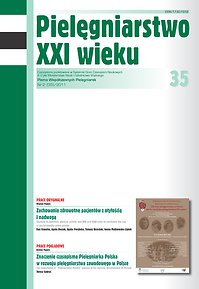Blood as a priceless gift – students of Cracow universities and honorary blood donation
Keywords:
blood, honorary blood donation, studentsAbstract
Introduction. Blood with its multiple functions is fundamental for human life and health. It is also a major and widely used therapeutic agent. Despite enormous technological progress, the attempts to create blood substitutes, which could replace it in every aspect, have failed so far. Therefore, generosity of honorary blood donors becomes substantial and necessary for saving human life and health.
Aim. The objectives of this work included recognition of knowledge, opinions, and experiences of students of Cracow universities regarding honorary blood donation.
Material and methods. The study was carried out between 1 March and 30 April 2010 and included 655 students of Cracow universities. Research material was obtained with a survey questionnaire developed by the authors.
The results. Only 22.90% of students participating in the study were blood donors. When asked about their motivations most of the respondents pointed to altruistic reasons. As far as the readiness to become a blood donor,, 16.49% of students said they were ready to donate blood.
Conclusions. Students may increase the number of honorary blood donor population. Therefore, the attitudes toward honorary blood donation presented in this social subgroup require further investigation. The outcomes of such studies may become the basis for promotion and educational interventions regarding honorary blood donation.
References
1. Konturek S., Brzozowski T.: Krew. Podstawowe funkcje krwi. W: Fizjologia człowieka. Fizjologia ogólna, krew i mięśnie. Podręcznik dla studentów wydziałów medycznych, red. Węgierska D., Kraków: Wydawnictwo UJ; 2003, str. 123-124.
2. Domagała B.: Krew najcenniejszy ludzki lek. Świat farmacji 2009; 7: 20-22.
3. Jeżewski Z. K., Homo - Homini „Ruch Honorowych Dawców Krwi”. Ostrów Wielkopolski: Zakład Wydawniczo – Drukarski, 2004
4. Kłos M.: Czy krew będzie potrzebna w przyszłości? Dar Krwi. Biuletyn Krajowej Rady Honorowego Krwiodawstwa Polskiego Czerwonego Krzyża 2002; 35: 4-6.
5. Brzeziński T. (red.), U podstaw nowożytnego pojmowania zdrowia i choroby. W: Historia medycyny, Warszawa: PZWL; 1995, str. 90-113.
6. Sieńkowski E., Chirurgia i specjalności zabiegowe w XIX i XX wieku. W: Historia medycyny, red. Brzeziński T., Warszawa: PZWL; 1995, str. 347-382.
7. Rosiek A., Dziewiątkowska A., Lachert E., Mandek-Czajkowska, Pogłód R.,
8. Łętowska M.: Działalność jednostek organizacyjnych służby krwi w Polsce w 2008 roku. J. Transfus. Med. 2009; 2, 4: 243-2528. Stowell C. P.: What ever happened to blood substitutes? Transfusion 2004; 44: 1403-1404.
9. Rosiek A., Rzymkiewicz L., Owczarska K., Łętowska M.: Ocena następstw wieloletniego oddawania krwi, osocza i koncentratów krwinek płytkowych. Acta Haematol. Pol. 2006; 37, 1: 75-84.
10. Rosiek A.: „Sztuczna krew” i inne preparaty krwiozastępcze. Blok operacyjny 2000; 3: 3-7.
11. Seyfried H., Brojer E., Grabarczyk P., Rosińska M., Gronowska A., Łętowska M.: Analiza częstości wykrywania markerów zakażenia wirusem zapalenia wątroby typu C (HCV) u Polskich dawców krwi w latach 1994-2003. Przegl. Epidemiol. 2005; 59: 807-814.
12. Majchrowska A. (red): Socjalizacja. Osobowość. Postawy. W: Wybrane elementy socjologii. Podręcznik dla studentów i absolwentów wydziałów pielęgniarstwa i nauk o zdrowiu akademii medycznych, Lublin: Wydawnictwo CZELEJ; 2003, str. 141-162.
13. Ray S., Singh C., Banerjee L.: Psychosocial variables of voluntary blood donors at blood bank of a medical college. Med. J. Armed Forces India 2005; 61: 130-132.
14. Nillson Sojka B., Sojka P.: The blood donation experience: self-reported motives and obstacles for donating blond. Vox Sang. 2008; 94: 56-63.
15. Vásquez M., Ibarra P., Maldonado M.: Conocimientos y actitudes hacia la donación de sangre en una población universitaria de Chile. Rev. Panam. Salud Publica / Pan Am. J. Public. Health 2007; 22, 5: 323-328.
16. Buciuniene I., Stoniene L., Blazeviciene A., Kazalauskaite R., Skudiene V.: Blond donors’ motivation and attitude to non-remunerated blond donation in Lithuania. BMC Public Health 2006; 6: 166 [Data cytowania 23.08.2010]. Dostępny pod adresem http://www.biomedcentral.com/1471-2458/6/166
17. Randolph Steele W., Schroeiber G.B., Guiltinan A., Nass C., Glynn S.A., Wright D.J., Kessler D., Schlumpf K.S., Tu Y., Smith J.W., Garratty G.: The role of altruistic, empathetic concern, and social responsibility motivation in blond donation behaviour. Transfusion 2008; 48: 43-54.
18. Hupfer M.E., Taylor D.W., Letwin J.A.: Understanding Canadian student motivations and beliefs abort giving blood. Transfusion 2005; 45: 149-161.
19. Marantidou O., Loukopoulou L., Zervou E., Martinis G., Egglezou A., Fountouli P., Dimoxenous P., Parara M., Gavalaki M., Maniatis A.: Factors that motivate and hinder blood donation in Greece. Transfus. Med. 2007; 17: 443-450.
Downloads
Published
Issue
Section
License
Copyright (c) 2011 Authors

This work is licensed under a Creative Commons Attribution 4.0 International License.




